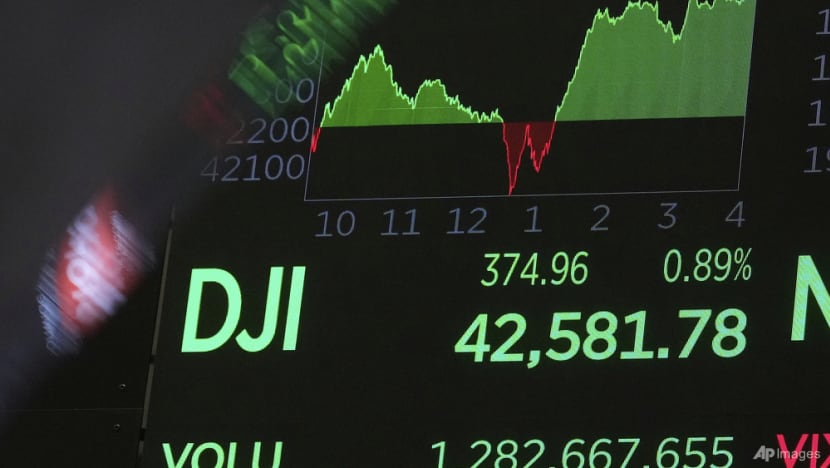Wall St ends higher as rate-cut hopes offset Iran war fears

A board above the trading floor of the New York Stock Exchange displays the closing number for the Dow Jones industrial average, Jun 23, 2025. (Photo: AP/Richard Drew)
NEW YORK: Wall Street rallied on Monday (Jun 23) as prospects of the US Federal Reserve cutting interest rates as early as July offset uncertainty about escalating turmoil in the Middle East.
All three major US stock indexes closed sharply higher. Consumer discretionary stocks led the sector gainers, with a solid boost from Tesla.
"The rally is a bit surprising," said Jay Hatfield, CEO and portfolio manager at InfraCap in New York. "In a way, the US attack puts an end to the uncertainty of whether the US is going to attack."
"The market action is extremely bullish because this is the time frame in June when we're supposed to have a pullback," Hatfield added. "People do not want to sell in this market."
Fed Vice Chair Michelle Bowman said on Monday "it is time to consider adjusting the policy rate," as risks to the job market outweigh inflationary concerns related to tariffs. Chicago Fed President Austan Goolsbee said that thus far, tariffs have had a more modest economic impact than expected.
Financial markets are pricing in at least two 25-basis-point rate cuts before year-end. The first cut is widely expected to happen in September.
"I've been in the camp that the Fed probably would not move at all this year," said Paul Nolte, senior wealth advisor & market strategist at Murphy & Sylvest in Elmhurst, Illinois. "(Fed Chair) Powell’s ‘wait and see’ is probably not a bad tactic, but of course, the markets always love lower interest rates."
Tesla shares surged after the long-awaited launch of the company's robotaxi service in Austin, Texas. The electric vehicle maker's shares advanced 8.2 per cent.
Israel continued to bombard Iran the day after the US joined the war.
Still, oil prices tumbled after Iran's retaliation did not include action to disrupt oil and gas tanker traffic through the Strait of Hormuz. Tehran had warned it would close the Strait of Hormuz, a crucial oil shipping route.
Oil prices settled down more than 7 per cent on Monday (Jun 23), losing more than US$5 a barrel.
Brent crude futures LCOc1 closed down US$5.53, or 7.2 per cent, at US$71.48 a barrel, while US West Texas Intermediate crude (WTI) CLc1 eased US$5.53, or 7.2 per cent, to US$68.51.
Brent's 7.2 per cent drop was the steepest since August 2022. The benchmark traded in a US$10 range, the widest since July 2022.
Both benchmarks were down nearly 9 per cent in after-hours trading.
"The markets are reading this as 'hey, we're successful,' we took out their nuclear capabilities and we were able to support any counter-strikes," Nolte said. "I think there was a lot of concern that Iran would do much more than it did."
On the economics front, S&P Global's advance "flash" purchasing managers' indexes (PMI) showed the US economy is expanding at a slightly more robust pace than analysts anticipated. A separate report showed new home sales, while under pressure from elevated borrowing costs, posted an unexpected gain in May.
Later in the week, the Commerce Department's final take on first-quarter GDP and its Personal Consumption Expenditures (PCE) and Fed Chair Jerome Powell's congressional testimony are likely to be parsed for clues regarding the near-term path of monetary policy.
The Dow Jones Industrial Average rose 374.96 points, or 0.89 per cent, to 42,581.78, the S&P 500 gained 57.33 points, or 0.96 per cent, to 6,025.17 and the Nasdaq Composite gained 183.57 points, or 0.94 per cent, to 19,630.98.
Among the 11 major sectors of the S&P 500, consumer discretionary stocks led the gainers, while energy, weighed by falling crude prices, was the only sector to close in negative territory.
Fiserv's shares rose 4.4 per cent following its announcement that it would launch a new digital asset platform.

Northern Trust jumped 8.0 per cent after a Wall Street Journal report said Bank of New York Mellon broached the topic of a potential merger.
AI-server-maker Super Micro Computer dropped 9.8 per cent after it announced a private offering of US$2 billion five-year convertible bonds.
Quarterly results from sportswear company Nike and package delivery firm FedEx are expected later in the week.
Advancing issues outnumbered decliners by a 2.35-to-1 ratio on the NYSE. There were 128 new highs and 71 new lows on the NYSE.
On the Nasdaq, 2,591 stocks rose and 1,875 fell as advancing issues outnumbered decliners by a 1.38-to-1 ratio.
The S&P 500 posted 12 new 52-week highs and 4 new lows while the Nasdaq Composite recorded 91 new highs and 113 new lows.
Volume on US exchanges was 18.60 billion shares, compared with the 18.16 billion average for the full session over the last 20 trading days.
Stock futures rose after President Donald Trump said a ceasefire has been agreed to between Israel and Iran.
S&P 500 emini futures rose 0.3 per cent and Nasdaq futures added 0.5 per cent, suggesting traders expect Wall Street to climb when it opens on Tuesday.
US crude futures fell on Tuesday to their lowest level in more than a week as Trump's ceasefire comments, relieved of worries of supply disruption in the area.
US West Texas Intermediate crude fell US$3.05, or 4.45 per cent, to US$65.46 per barrel as of 1026 GMT, after hitting its lowest level since Jun 11 earlier in the session.
The contract settled over 7 per cent lower in the previous session.
Trump announced that Israel and Iran have fully agreed to a complete ceasefire, adding that Iran will begin the ceasefire immediately, followed by Israel after 12 hours. If both sides maintain peace, the war will officially end after 24 hours, concluding a 12-day conflict.














